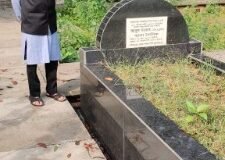….Maa go tomar koley, tomar boley, kotoy shanti bhalobasha, aa mori Bangla bhasha….
People originating in the sub continent should know that in 1947 India and Pakistan was divided on the basis of religion solely. Moreover newly formed Muslim Pakistan consisted of East and West Pakistan which was nevertheless divided oblivious to the myriad linguistic and cultural diversity in the 1000 miles between them. A country thus then where 6% of the population were Urdu speakers and 54% Bengali, the Bengalis were intolerated. Mohammed Ali Jinnah insisted on Urdu as its state language. From the onset the East Pakistan Renaissance Society formed in 1942 at the offices of the Dainik Azad newspaper headquarters in Calcutta insisted on a separate East Pakistan based on Muslim Bengalis based on their own cultural and linguistic demand rather than one state of Pakistan. Sylhet based Central Muslim Literary Society, established in 1936 and their monthly magazine Al-Islah played a pivotal role in formulating movements to protest Urdu being the state language of Pakistan and demanding that Bangla was so. In Dhaka the first movement on the issue of Bangla also as a state language was mobilised by Tamaddun Majlish, an Islamic cultural organization headed by Professor Abul Kashem. Gradually many other non-communal and progressive organisations joined the movement, which finally turned into a mass movement. Fazlur Rahman, the central education Minister, however did everything to oppose these movements and Muhammed Ali Jinnah. First Governor and Speaker of the National Assembly insisted that Urdu and only Urdu shall be the state language of Pakistan in its entirety.
Eventually 20th February 1952 saw the placing of a legal order prohibiting processions and meetings of students rallying against the subjugation of the Bangla language, arresting student leaders. Students gathered on the river Surma to find ways of defeating the court order. They decided that students would lead a procession 10 by 10 as 10 people were allowed to gather. And thus they did whilst still getting arrested.
On 21st February Dhaka City saw Thousands of students from different schools and colleges of Dhaka assembled on the university campus while armed police waited outside the gate. When the students emerged in groups, shouting slogans, the police resorted to baton charge; even the female students were not spared. They fired upon the crowd of students, who were proceeding towards the Assembly Hall (at present, part of Jagannath Hall, University of Dhaka) killing at least 12 students. They continued t to arrested and jailed over the next few days.
The Bengalis were not going to stop demanding to be themselves. On 23 February, a temporary memorial was erected at the spot where students had been killed which in 1963, was replaced by a concrete memorial, the Shaheed Minar (martyrs’ memorial).
On 16 February 1956, the Pakistani constitution finally recognised that both Bangla and Urdu were state languages; however East Pakistan continued to be underrepresented and received a minority of state funding or any other resources or state help. This eventually led to the liberation of East Pakistan to the independent nation of Bangladesh after a bloody and heinous war of 1971 against the West’s oppression.
Cultural domination and oppression includes the domination over choice of language. This paved the way for recognition of cultural dominance in other parts of the world and 1952 became the symbol of language oppression in the world. Thus in 1999 UNESCO announced International Mother Language Day as a worldwide annual observance to be held on 21 February to promote awareness of linguistic and cultural diversity and multilingualism. The date represents the day in 1952 when the martyrs of Bangla language is commemorated. The martyrs who risked and ultimately gave up their life simply for the right to speak and communicate in ones’ own language.
The idea of a Universal Declaration of Linguistic Rights was first proposed in 1984, where a Brazilian by the name of Francisco Gomes de Matos introduced to the International Federation of Modern Language Teachers (FIPLV). There was a plea for a Declaration in the 1947 Universal Declaration of Human Rights 1948; however, there were no elaborations on linguistic rights.
Gomes de Matos listed some of the principle linguistic rights, together with its educational implications. He set out two typologies and from the first typology some examples are:
- Linguistic equality: Every human being has the right to be treated linguistically with respect and equality.
- Language acquisition: Every person has the right to acquire his/her native language. In instances of countries that have become independent, its citizens have the right to choose their national language.
- ..
- ..
- Linguistic choice-making: Every language user has the right to choose a variety (regional, social, professional) according to his/her communicative needs. Accordingly, s/he has the right to choose the pronunciation, the vocabulary, the grammar (syntactic constructions), and the style to use. Being a polyglot in one’s own native language should be an individual linguistic right……
On 16 May 2007 the United Nations General Assembly called upon Member States “to promote the preservation and protection of all languages used by peoples of the world”. By the same resolution, the General Assembly proclaimed 2008 as the International Year of Languages to promote unity in diversity and international understanding, through multilingualism and multiculturalism.
However how far has this need for individual linguistic rights been achieved? The document adopted at the conclusion of the World Conference on the Universal Declaration of Linguistic Rights that was held on 6–9 June 1996 in Barcelona, Spain has not yet gained formal approval from UNESCO. Peace must be established on humanities moral and intellectual solidarity is UNESCO’s belief and thus we remain waiting for this declaration to be given formal approval by UNESCO.
Without intellectual and moral solidarity, Intolerance of languages and cultures seems to be the petty norm. A norm that illogically perhaps believe other cultures and languages somehow harm them. Cultural domination has meant that those languages that are not naturally dying out will be and are indeed being murdered at a pace so fast it is terrifying. Through educational systems, mass media, political beliefs and brutal domination and denial of existence of human beings on the planet, their languages are murdered.
Human beings, the most powerful animal believe they own the earth. So they destroy the earth faster than they understand the earth. They destroy the eco systems; they destroy the very civilization they also fight to build. Linguistic and cultural diversity is as essential in nurturing and developing humanity as maintaining biodiversity to protect nature. Yet Greed Power and Rule are the food of intolerance.
Muhammed Ali Jinnah’s two nation theory had no space for tolerance. There was no space for tolerance in the torture and imprisonment and torture of Kurdish children and youngsters in Turkey, simply because they wanted Kurdish taught as a subject in schools and at universities (e.g. IMK 2002). The struggle for recognition of the Kurdish in Turkey since 1922, does not have space for tolerance or understanding about the damage being done to the fabric of humanity and our existence on this planet because of it. .
Bangladesh had a different history rooted with the thousand years of age Pohela Boishaak, which I have called ‘mother of secularism’ as it was a truly secular festival that celebrated purely a national identity irrespective of religion, colour or ethnicity. This gave Bengalis at least a platform and the history of co-existing in harmony and dignity. This historical strength created opportunity to develop 21 February which has now world recognition and is observed globally as International Mother Language Day.
Others do not have a platform to fight such as the Kurds and many other minority languages and cultures and thus this writer proposes that we Bengali’s pride in our Language movement day gifted to the world to bring out a piece of humanity that has to be celebrated to mark the existence of all languages in the world no matter how big or small, how much political support it has or hasn’t, along with Bangla.
In the words of PROF. E. Nolue Emenanjo National institute for Nigerian Languages PMB 7078
‘The symbiotic relationship that exists between human language and culture, more so in a society in which there still is very strong and robust language loyalty, is one of the givens in sociolinguistic discourse. Essentially a mentifact and a sociofact created by particular people living in a particular geo-political society at particular periods in history, for intra-group communication purposes, human language is a mirror and the marker of self-image and group identity. An essential element of ethnicity – with religion and culture, language is a feature for both differentiation and identification. All these cut across all polities, whatever are their internal geo-political and sociolinguistic profiles, arrangements and configurations. The norm in most countries of the world is not monoculturalism and monolingualism but cultural and political pluralism and multilingualism.’
Thus the utmost respect for all languages and dialects is what we ought to take from 21st February. It is a prerequisite to respect and accept diversity and only then can we have truly equal treatment of people. Equality is ensuring individuals or groups of individuals are treated fairly and equally and not less favourably, specific to their needs, including areas of race, gender, disability, religion or belief, sexual orientation, age and to include in this is Culture and Language. Respecting and valuing people’s differences realises their full potential by promoting an inclusive culture of humanity.
A Country’s Language Policy must encompass all minorities, all languages, dialects within that country. Language Policy in the UK now includes migrant languages, autochthonous minority languages Scottish Gaelic with The Gaelic Language Act 2005, The Welsh Language Act 1993. In 2014 the Cornish minority language was fully recognized under European rules for the protection of National minorities.
Language experts also discuss saving the worlds endangered indigenous languages such as in Australia China Ireland and Spain as we have a lot to learn from the knowledge that come with the languages.
Bangladesh has 13 million Chittagonian speakers and over 10 million Sylhetti speakers including expatriates. It is a fact that women in villages of these districts with low level of education do not understand Bangla. Likewise many expatriates left Bangladesh from those villages whose children now speak European languages. Those that learn Bangla have had the cognitive help of bilingualism which has shown the ease of language acquisition by processing it through the language they already possess. Likewise outside of Bangladesh the need for Sylhetti translators and bilingual teachers has demonstrated the cognitive development of a child or the cultural and linguistic background of a person cannot be ignored. So alongside our glorious Bangla, non official languages like Sylhetti and Chittagonian and any other minority languages, traditions, cultures and folklore and minority religions need to be protected, recognized not shunned if the link between culture history and language is understood and if the cognitive benefits of bilingualism and the notion of International Mother Language day is supposed to mean anything at all.
In addition to the lesson from protected Welsh and Gaelic languages in UK, it must be said as a UK raised citizen, that, it is totally possible to love one’s own heritage, language from the country of origin and any regional language and still be incredibly British, Bengali and Sylheti.
Piya Mayenin Solicitor and Community Activist
piara.mayenin@btinternet.com
20/2/2016
 Weekly Bangla Mirror | Bangla Mirror, Bangladeshi news in UK, bangla mirror news
Weekly Bangla Mirror | Bangla Mirror, Bangladeshi news in UK, bangla mirror news






